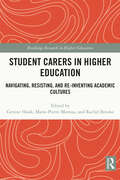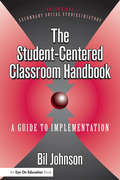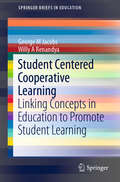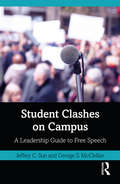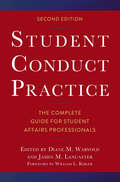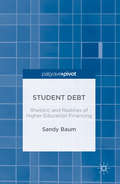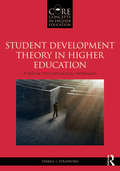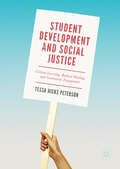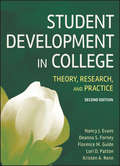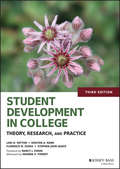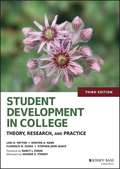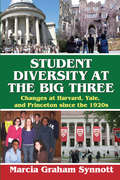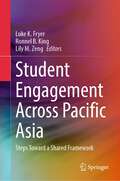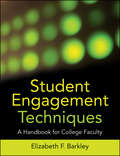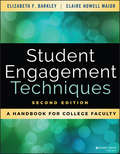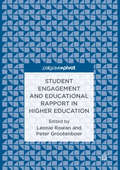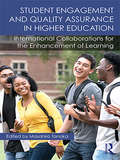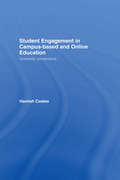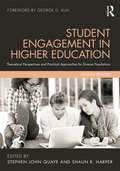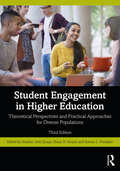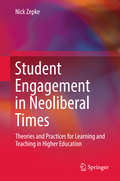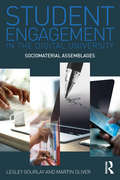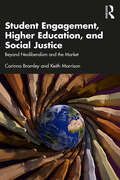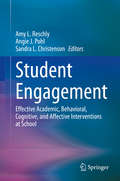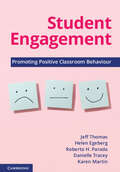- Table View
- List View
Student Carers in Higher Education: Navigating, Resisting, and Re-inventing Academic Cultures (Routledge Research in Higher Education)
by Genine Hook, Marie-Pierre Moreau, and Rachel BrooksThis timely volume explores the ways that university institutions affect the experiences of student carers and how student carers negotiate the (often conflicting) demands of care and academic work. The book maps the experiences of student carers in academic cultures, exploring the intersectional ways in which gender, class, race and other social categories define who can take up a position as a student and a carer. It is framed by concerns of equity and diversity in higher education and ways that diverse people with wide-ranging care responsibilities are able to access and engage with degree-level study. The book promotes the idea of a more inclusive and equitable higher education environment and supports the emergence of more ‘care-full’ academic cultures which value and recognise care and carers. The book will be highly relevant reading for academics, researchers and post-graduate students with an interest in higher education, social justice, gender studies and caring responsibilities. It will also be of interest to postgraduate students in sociology of education as well as higher education policymakers.
Student Centered Classroom, The: Vol 1: Social Studies and History
by Eli JohnsonWhat does a student-centered social studies classroom really look like? Renowned educator Bil Johnson reveals how to teach social studies so that your students become engaged, active, and responsible learners. This book demonstrates how student-centered strategies can be applied in your classroom. It shows you how to make students’ work the focus of what occurs in your classroom, prepare lesson plans based on what students should know and be able to do, and create a classroom environment revolving around rigorous and creative student activity. Also included are classroom examples of socratic seminars and other forms of group work such as simulations and role playing, performances and exhibitions, projects and portfolios, and other demonstrations of student learning.
Student Centered Cooperative Learning: Linking Concepts in Education to Promote Student Learning (SpringerBriefs in Education)
by George M Jacobs Willy A RenandyaThis book helps teachers understand the links between cooperative learning (also known as collaborative learning and peer learning) and other student-centered approaches. It discusses cooperative learning and communities of practice; cooperative learning and neuroscience; cooperative learning and critical thinking; cooperative learning and alternative assessment; cooperative learning and multiple intelligence; cooperative learning and positive education; cooperative learning and meeting the needs of introverts; and cooperative learning and justice issues, with each chapter exploring a different aspect of how education can be student centered.If you are looking for a fresh perspective on cooperative learning, this book is for you. It helps you explore how cooperative learning is so much more than just asking students to arrange themselves in a group, and considers how cooperative learning can fit with other areas of education that you care about. Although the two authors both completed their PhDs in the West, they have taught in Asia for the past 25+ years, working with students and teachers from a wide variety of Asian and other countries, and with teachers from a very wide variety of content areas who teach students of many different ages.
Student Clashes on Campus: A Leadership Guide to Free Speech
by George S. McClellan Jeffrey C. SunThis book unpacks the tension between free speech and the social justice priority to support all students. Drawing on court cases, institutional policies and procedures, and notable campus practices, this book answers the question: How do campus leaders develop interests of social justice and create a campus that is inclusive and inviting of all identities while also respecting students’ free speech rights? This useful guide provides insights about the myriad of challenges that campus leaders have faced, along with practical approaches to address these issues on their own campuses. Experts Sun and McClellan interrogate the assumptions, thoughts, events, rules, and actions often at-play when free expression clashes with a college’s mission of diversity, inclusion, and social justice. This book helpfully guides campus leaders to consider a series of legal frameworks and promising policies as solutions for balancing social justice and free speech.
Student Conduct Practice: The Complete Guide for Student Affairs Professionals
by Diane M. Waryold, James M. LancasterSince the publication of the first edition of Student Conduct Practice in 2008 the landscape of student conduct has matured and shifted dramatically. As the composition of the overall population and of the student body on campuses across the nation has changed, institutions of higher learning have a greater awareness of the importance of preparing students to function competently in a diverse society. They are seeing student behaviors, such as challenging mores, rules and policies, that reflect the growing polarization and complexity we see in our larger society, and such trends as a marked increase in student mental health challenges as well as changing social dynamics, all of which require a new awareness and a rethinking of policies and responses by conduct professionals, including embracing the a social justice as a lens by which we perform our work.This updated and considerably expanded edition maintains the objectives of the first--to constitute a compendium of current best practices in the administration of student conduct, to summarize the latest thinking on key issues facing practitioners today, and to provide an overview of the role and status of conduct administrators within their institutions.This text invites student conduct administrators to examine current programs and policies to ensure that the spaces that they create during interactions with students are spaces in which all students feel welcome and heard. As we strive to prepare students not only to be productive members of today’s workforce, and more importantly to be good people and upright citizens, this text accentuates the delicate balance between responding to regulatory mandates and meeting the educational aims of student conduct. The aim is to offer those with an interest in student conduct and those professionals who are new or seasoned student conduct administrators with both a compendium of chapters on best practices and the background to grapple with the thought-provoking situations they will encounter. In close collaboration with the leadership of the Association for Student Conduct Administration (ASCA) the editors identified the most pressing conduct issues on our campuses and practitioners and faculty who offer related expertise and a necessary diversity of voices.This is also available as a set with Reframing Campus Conflict, Second Edition.
Student Debt
by Sandy BaumThis book analyzes reliable evidence to tell the true story of student debt in America. One of the nation's foremost experts on college finance, Sandy Baum exposes how misleading the widely accepted narrative on student debt is. Baum combines data, research, and analysis to show how the current discourse obscures serious problems, risks misdirecting taxpayer dollars, and could deprive too many Americans of the educational opportunities they deserve. This book and its policy recommendations provide the basis for a new and more constructive national agenda to make paying for college more manageable.
Student Development Theory in Higher Education: A Social Psychological Approach (Core Concepts in Higher Education)
by Terrell L. StrayhornMoving beyond the theories traditionally used to describe college student development, this engaging book introduces social psychological theories that address the most relevant issues in higher education today. Covering theories of ecological systems, sense of belonging, prejudice and discrimination, positive psychology, social capital, personality theory, mentoring, and hope theory, this book promotes the understanding and application of social psychological theories to various higher education contexts. Examples from diverse student populations encourage learners’ application to situations in their own contexts. Comprehensive enough to be used as a main text but accessible enough to be used alongside another, this important textbook bridges research, theory, and practice to help practicing and aspiring higher education and student affairs professionals effectively work with college students.<P><P> Special Features Include:<P> • Reflective exercises that combine theory and practice and help students apply their knowledge solving problems.<P> • Case studies and scenarios for further connections to the reader’s university and college settings.<P> • Guiding questions that encourage students to think beyond the current literature and practice.<P> • List of further readings and references for readers to explore topics in more depth.<P>
Student Development and Social Justice
by Tessa Hicks PetersonThis book weaves together critical components of student development and community building for social justice to prepare students to engage effectively in community-campus partnerships for social change. The author combines diverse theoretical models such as critical pedagogy, asset-based community development, and healing justice with lessons from programs promoting indigenous knowledge, decolonization, and mindfulness. Most importantly, this book links theory to practice, offering service-learning classroom activities, course and community partnership criteria, learning outcomes, and assessment rubrics. It speaks to students, faculty, administrators, and community members who are interested in utilizing community engagement as a vehicle for the development of students and communities towards wellbeing and social justice.
Student Development in College
by Florence M. Guido Lori D. Patton Nancy J. Evans Deanna S. Forney Kristen A. RennThe second edition of Student Development in College will help student affairs practitioners understand the developmental challenges facing today's college students. It will provide scholars with a comprehensive and inclusive overview of the most important student development theories and related research, including new approaches with which they may not be familiar, particularly related to social identity development. Most importantly, it will assist student affairs professionals in designing individual, group, and institutional approaches to work more effectively with students at various developmental levels and to facilitate student growth.This second edition includes the "foundational theories" of student development found in the first edition, but also offers newer integrative social identity theories that look at student development in a more holistic way. These theories are critical for understanding the diverse student populations of the twenty-first century.TABLE OF CONTENTSPrefacePart One: Understanding and Using Student Development TheoryPart Two: Foundational TheoriesPart Three: Integrative TheoriesPart Four: Social Identity DevelopmentReferences
Student Development in College: Theory, Research, and Practice
by Florence M. Guido Lori D. Patton Kristen A. Renn Stephen John QuayeTHE ESSENTIAL STUDENT DEVELOPMENT REFERENCE, UPDATED WITH CUTTING-EDGE THEORY AND PRACTICE Student Development in College is the go-to resource for student affairs, and is considered a key reference for those most committed to conscious and intentional student affairs practice. This third edition includes new chapters on social class, disability, and emerging identity theories, with expanded coverage of faith and gender identity. A new framework provides guidance for facilitating dialogues about theory, teaching theory, and the importance of educators as consumers of theory. Discussion questions conclude each chapter and vignettes are woven throughout to provide practical context for theory. Learning activities in the appendix promote comprehension and application of theory. Get updated on the latest in student development theory and application Consider both the psychosocial and cognitive aspects of identity Learn strategies for difficult dialogues, and the importance of reflection Adopt an integrated, holistic approach to complex student development issues Student Development in College is the ideal resource for today's multifaceted student affairs role. "With five new or expanded chapters and critical updates throughout the text, this third edition expertly presents the complex, multifaceted, and continually evolving nature of the theories that inform scholars and professionals in their research and practice with college students. These authors, consummately aware of the needs of emerging and continuing student affairs professionals, have crafted a text that will be both eminently practical and intellectually engaging for graduate students, professionals, and faculty alike." —Dafina-Lazarus Stewart, associate professor, higher education and student affairs, Bowling Green State University "This third edition of Student Development in College beautifully presents the theoretical terrain of student development by honoring the foundational theories upon which the field was developed and foregrounding newer theories with brand new content and fresh perspectives. The result is a text that is comprehensive, sophisticated, and accessible—and one that is attuned to the contemporary realities of the complexities of student development." —Susan R. Jones, professor, higher education and student affairs, The Ohio State University
Student Development in College: Theory, Research, and Practice (Third Edition)
by Lori D. Patton Kristen A. Renn Florence M. Guido Stephen John QuayeTHE ESSENTIAL STUDENT DEVELOPMENT REFERENCE, UPDATED WITH CUTTING-EDGE THEORY AND PRACTICE<p><p> Student Development in College is the go-to resource for student affairs, and is considered a key reference for those most committed to conscious and intentional student affairs practice. This third edition includes new chapters on social class, disability, and emerging identity theories, with expanded coverage of faith and gender identity. A new framework provides guidance for facilitating dialogues about theory, teaching theory, and the importance of educators as consumers of theory. Discussion questions conclude each chapter and vignettes are woven throughout to provide practical context for theory. Learning activities in the appendix promote comprehension and application of theory.
Student Diversity at the Big Three: Changes at Harvard, Yale, and Princeton Since the 1920s
by Marcia SynnottStrengthening affirmative action programs and fighting discrimination present challenges to America's best private and public universities. US college enrollments swelled from 2.6 million students in 1955 to 17.5 million by 2005. Ivy League universities, specifically Harvard, Yale, and Princeton, face significant challenges in maintaining their professed goal to educate a reasonable number of students from all ethnic, racial, religious, and socio-economic groups while maintaining the loyalty of their alumni. College admissions officers in these elite universities have the daunting task of selecting a balanced student body. Added to their challenges, the economic recession of 2008-2009 negatively impacted potential applicants from lower-income families. Evidence suggests that high Standard Aptitude Test (SAT) scores are correlated with a family's socioeconomic status. Thus, the problem of selecting the "best" students from an ever-increasing pool of applicants may render standardized admissions tests a less desirable selection mechanism. The next admissions battle may be whether well-endowed universities should commit themselves to a form of class-based affirmative action in order to balance the socioeconomic advantages of well-to-do families. Such a policy would improve prospects for students who may have ambitions for an education that is beyond their reach without preferential treatment. As in past decades, admissions policies may remain a question of balances and preferences. Nevertheless, the elite universities are handling admission decisions with determination and far less prejudice than in earlier eras.
Student Engagement Across Pacific Asia: Steps toward a Shared Framework
by Ronnel B. King Luke K. Fryer Lily M. ZengStudent engagement at the programme and university levels are both critical to students' success in higher education. This book establishes a theoretical and empirical framework for assessing these student experiences together. To this end, the book brings together the two major fields of university quality assurance (US [university engagement] and UK [programme experiences]). This edited book then shows how this integrated approach applies to university experiences across Pacific Asia (Hong Kong, Mainland China, Philippines, Korea, Japan, and Taiwan). It demonstrates how the proposed quality assurance framework can be applied as an intra-institutional tool to enhance student experiences. For readers interested in future of Asia Pacific higher education, this book presents a path towards enhanced cross-national communication between Asia Pacific universities.
Student Engagement Techniques
by Elizabeth F. BarkleyKeeping students involved, motivated, and actively learning is challenging educators across the country,yet good advice on how to accomplish this has not been readily available. Student Engagement Techniques is a comprehensive resource that offers college teachers a dynamic model for engaging students and includes over one hundred tips, strategies, and techniques that have been proven to help teachers from a wide variety of disciplines and institutions motivate and connect with their students. The ready-to-use format shows how to apply each of the book's techniques in the classroom and includes purpose, preparation, procedures, examples, online implementation, variations and extensions, observations and advice, and key resources."Given the current and welcome surge of interest in improving student learning and success, this guide is a timely and important tool, sharply focused on practical strategies that can really matter."?Kay McClenney, director, Center for Community College Student Engagement, Community College Leadership Program, the University of Texas at Austin"This book is a 'must' for every new faculty orientation program; it not only emphasizes the importance of concentrating on what students learn but provides clear steps to prepare and execute an engagement technique. Faculty looking for ideas to heighten student engagement in their courses will find usefultechniques that can be adopted, adapted, extended, or modified."?Bob Smallwood, cocreator of CLASSE (Classroom Survey of Student Engagement) and assistant to the provost for assessment, Office of Institutional Effectiveness, University of Alabama"Elizabeth Barkley's encyclopedia of active learning techniques (here called SETs) combines both a solid discussion of the research on learning that supports the concept of engagement and real-life examples of these approaches to teaching in action."?James Rhem, executive editor, The National Teaching & Learning Forum
Student Engagement Techniques: A Handbook for College Faculty
by Elizabeth F. Barkley Claire H. MajorPractical Strategies and Winning Techniques to Engage and Enhance Student Learning The revised and updated second edition of Student Engagement Techniques is a much-needed guide to engaging today's information-overloaded students. The book is a comprehensive resource that offers college teachers a dynamic model for engaging students and includes over one hundred tips, strategies, and techniques that have been proven to help teachers across all disciplines motivate and connect with their students. This edition will provide a deeper understanding of what student engagement is, demonstrate new strategies for engaging students, uncover implementation strategies for engaging students in online learning environments, and provide new examples on how to implement these techniques into STEM fields. "Student Engagement Techniques is among a handful of books—several of which are in this series!—designed specifically to help instructors, regardless of experience, create the conditions that make meaningful, engaged learning not just possible but highly probable." —Michael Palmer, Ph.D., Director, Center for Teaching Excellence, Professor, General Faculty, University of Virginia "This practical guide to motivating and engaging students reads like a quite enjoyable series of conversations held over coffee with skilled colleagues. It has been met with delight from every faculty member and graduate instructor that we've shared the book with!" —Megan L. Mittelstadt, Ph.D., Director, Center for Teaching and Learning, The University of Georgia "Student Engagement Techniques belongs in the hands of 21st century instructors and faculty developers alike. Its research-based, specific, yet broadly applicable strategies can increase student engagement in face-to-face and online courses in any discipline." —Jeanine A. Irons, Ph.D., Faculty Developer for Diversity, Equity, and Inclusion, Center for Teaching and Learning Excellence, Syracuse University "This book is an essential resource for faculty seeking to better engage with their students. Anyone seeking a clear, research-based, and actionable guide needs a copy of Student Engagement Techniques on their shelf!" —Michael S. Harris, Ed.D., Associate Professor of Higher Education, Director, Center for Teaching Excellence, Southern Methodist University
Student Engagement and Educational Rapport in Higher Education
by Peter Grootenboer Leonie RowanThis book outlines a range of innovative methods to gather student feedback, and explores the complex relation between student engagement, student satisfaction, and student success. Drawing on results from a set of numerous case-studies carried out at a school of education, the book reports on a range of theoretically-informed teaching innovations, including focus groups, learning analytics data, collegial conversations and insights from student researchers, that have been designed to create respectful, student-centred, and engaging learning environments. In the current climate of ever-increasing pressure on delivering high student satisfaction rates, these results are invaluable for university students and teachers across the globe. With its unique thematic focus on educational rapport and relationship-centred education, the book is an excellent reference point for staff with a commitment to the scholarship of learning and teaching. It will be of great interest to students, practitioners, teachers and policy makers in higher education.
Student Engagement and Quality Assurance in Higher Education: International Collaborations for the Enhancement of Learning
by Masahiro TanakaUsing a range of international examples to compare the reality, purpose and effect of student engagement in universities across the globe, Student Engagement and Quality Assurance in Higher Education argues that teachers and students need to collaborate to improve the quality of university education and student learning. The growing trend of assessing and assuring quality in higher education is incredibly complex, as there are so many variables affecting both experiences and measures. With case studies from ten countries, covering a variety of cultural and environmental settings, this book focusses on ways of working with students to produce applicable, implementable strategies for universities the world over. Internationally applicable, this book presents ideas from a range of cultures, which can be adapted to be implemented in a variety of cultures. The reader is provided with a range of approaches where both the advantages and disadvantages are clearly presented. The ten case studies consider the macro, meso and micro levels of each approach, allowing for an exploration of the growing area of research and practice that is student–staff partnerships, showcasing ways of working with students to enhance engagement and quality, which are vital for a long-term approach. Focussing on one of the main reform topics for universities, Student Engagement and Quality Assurance in Higher Education is essential reading for educational researchers, institutional leaders and all concerned with the implementation and progression of student engagement and quality assurance in higher education.
Student Engagement in Campus-Based and Online Education: University Connections
by Hamish CoatesBlended learning is firmly established in universities around the world, yet to date little attention has been paid to how students are enaging with this style of learning. Presenting a theoretically-based and empirically-validated model of engagement, this book examines the application of the model to improve the quality and productivity of university education. Covering the key qualities of blended learning, it analyses how online learning influences campus-based education, develops the student perspective of online learning, examines online learning systems as agents of change, provides insights and guidance for educational developers and administrators attempting to improve quality of learning, and considers how institutions can maximise educational returns from large investments in online learning technologies. Illustrated with case studies and developing ideas for practice, this book will be valuable reading for researchers and developers keen to improve their understanding of the emerging dynamics of contemporary student engagement with online learning.
Student Engagement in Higher Education: Theoretical Perspectives and Practical Approaches for Diverse Populations
by Shaun R. Harper Stephen John QuayeStudent Engagement in Higher Education fills a longstanding void in the higher education and student affairs literature. In the fully revised and updated edition of this important volume, the editors and chapter contributors explore how diverse populations of students experience college differently and encounter group-specific barriers to success. Informed by relevant theories, each chapter focuses on engaging a different student population, including: low-income students, students of color, international students, students with disabilities, LGBT students, religious minority students, student-athletes, homeless students, transfer students, commuter and part-time students, adult learners, student veterans, and graduate students. The forward-thinking, practical strategies offered throughout the book are based on research and the collected professional wisdom of experienced educators and scholars at two-year and four-year institutions of higher education. Current and future faculty, administrators, and student affairs staff will undoubtedly find this book complete with fresh ideas to reverse troubling engagement trends among various college student populations.
Student Engagement in Higher Education: Theoretical Perspectives and Practical Approaches for Diverse Populations
by Shaun R. Harper Stephen John Quaye Sumun L. PendakurIn the updated edition of this important volume, the editors and chapter contributors explore how diverse populations of students experience college differently and encounter group-specific barriers to success. Informed by relevant theories, each chapter focuses on engaging a different student population, including low-income students, Students of Color, international students, students with disabilities, religious minority students, student-athletes, part-time students, adult learners, military-connected students, graduate students, and others. New in this third edition is the inclusion of chapters on Indigenous students, student activists, transracial Asian American adoptee students, justice-involved students, student-parents, first-generation students, and undocumented students.The forward-thinking, practical, anti-deficit-oriented strategies offered throughout the book are based on research and the collected professional wisdom of experienced educators and scholars at a range of postsecondary institutions. Current and future faculty members, higher education administrators, and student affairs educators will undoubtedly find this book complete with fresh ideas to reverse troubling engagement trends among various college student populations.
Student Engagement in Neoliberal Times
by Nick ZepkeThis book investigates origins, meanings, uses and effects of student engagement in higher education, and addresses three core questions: (1) Why is student engagement so visible in higher education today? (2) What are its dominant characteristics? (3) What is missing in the popular view of student engagement? These questions pave the way for a fresh approach to student engagement. The book argues that an elective affinity between student engagement and policies embedded in neoliberalism, the dominant ideology of the early 21st century, enables student engagement to transcend diverse intellectual and practice contexts. This affinity encourages quality learning and teaching that enables student to succeed in their studies and future careers. The book shows that focusing on neoliberal objectives for learning and teaching limits the potential of student engagement in higher education. This conclusion leads to a critical and practical social-ecological perspective that approaches engagement more as a pathway to social justice than as a list of techniques. This book is a work of critical scholarship backed by empirical research. It questions accepted theories and practices and offers fresh insights into student engagement in higher education, including how engagement could promote social justice.
Student Engagement in the Digital University: Sociomaterial Assemblages
by Martin Oliver Lesley GourlayStudent Engagement in the Digital University challenges mainstream conceptions and assumptions about students’ engagement with digital resources in Higher Education. While engagement in online learning environments is often reduced to sets of transferable skills or typological categories, the authors propose that these experiences must be understood as embodied, socially situated, and taking place in complex networks of human and nonhuman actors. Using empirical data from a JISC-funded project on digital literacies, this book performs a sociomaterial analysis of student–technology interactions, complicating the optimistic and utopian narratives surrounding technology and education today and positing far-reaching implications for research, policy and practice.
Student Engagement, Higher Education, and Social Justice: Beyond Neoliberalism and the Market
by Keith Morrison Corinna BramleyStudent engagement is a catch-all term, irresistible to educators and policy makers, and serving many agendas and purposes. This ground-breaking book provides a powerful theory of student engagement, rooted in critical theory and social justice. It sets out a compelling argument for student engagement to promote social justice and to repel neoliberalism in, and through, higher education, addressing three key questions: Student engagement in what? Student engagement for what? Student engagement for whom? The answers draw on Habermas, Honneth, Gramsci, Foucault, and Giroux in examining ideology, power, recognition, resistance, and student engagement, with examples drawn from across the world. It sets out key features, limitations, and failures of neoliberalism in higher education, and indicates how student engagement can resist it. Student engagement calls for higher education institutions to be sites for challenge, debate on values and power, action for social justice, and for students to engage in the struggle to resist neoliberalism, taking action to promote social justice, democracy, and the public good. This book is essential reading for educators, researchers, managers and students in higher education, social scientists, and social theorists. It is a call to reawaken higher education for social justice, human rights, democracy, and freedoms.
Student Engagement: Effective Academic, Behavioral, Cognitive, and Affective Interventions at School
by Amy L. Reschly Sandra L. Christenson Angie J. PohlThis book provides cutting-edge, evidence-based strategies and interventions that target students’ engagement at school and with learning. Coverage begins with the background and 29-year history of the Check & Connect Model and describes the model and assessment of student engagement that served as the backdrop for conceptualizing the engagement interventions described in the book. Subsequent chapters are organized around the subtypes of student engagement – academic, behavioral, affective, cognitive – that were developed based on work with the Check & Connect Model. Principles and formal interventions are presented at both the universal and more intensive levels, consistent with the Response-to-Intervention/Multi-Tiered System of Support (MTSS) framework. The book concludes with a summary on the lessons learned from Check & Connect and the importance of a system that is oriented toward enhancing engagement and school completion for all students. Interventions featured in this book include: Peer-Assisted Learning Strategies (PALS).The Homework, Organization, and Planning Skills (HOPS) Intervention.The Good Behavior Game in the classroom.Check-in, Check-out (CICO). Banking Time, a dyadic intervention to improve teacher-student relationshipsThe Self-Regulation Empowerment Program (SREP). Student Engagement is a must-have resource for researchers, professionals, and graduate students in child and school psychology, educational policy and politics, and family studies.
Student Engagement: Promoting Positive Classroom Behaviour
by Jeffrey Thomas Helen Egeberg Roberto H. Parada Danielle Tracey Karen MartinStudent Engagement: Promoting Positive Classroom Behaviour encourages pre-service teachers in Australian primary and secondary schools to make choices about how best to design and manage their classrooms and schools to maximise productive behaviour and learning. The text explores numerous dimensions of student engagement from within and outside school settings, including verbal and non-verbal communication; disengaged behaviours and corrective strategies; trauma-informed practice; working with students with emotional and behavioural disorders; and bullying prevention and intervention strategies. Linking to the Australian Professional Standards for Teachers (APSTs), each chapter includes 'Embedding the theory' and 'Story from the field' boxes that discuss the theoretical research behind different approaches to engagement and explore their practical applications. 'Making professional decisions' boxes at the end of each chapter also provide further guidance on how to approach different situations and build a repertoire of resources for practice.
